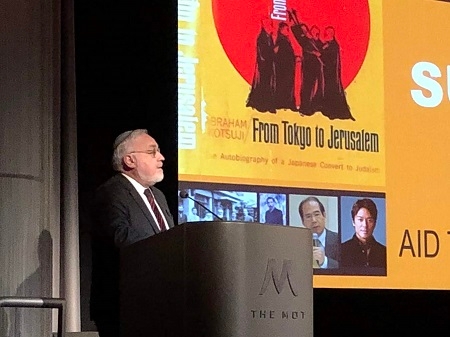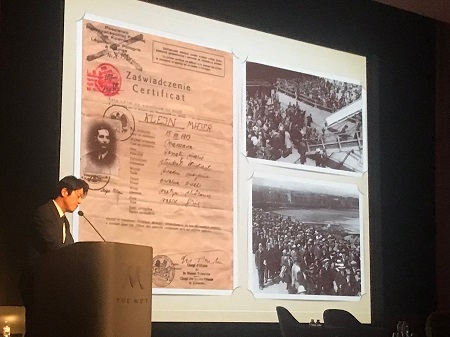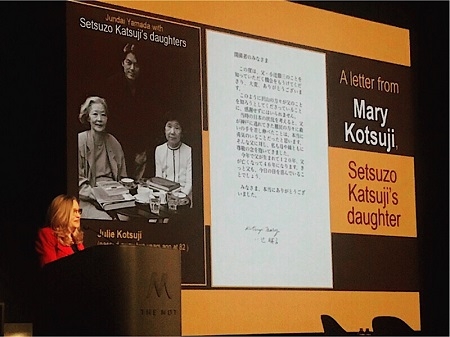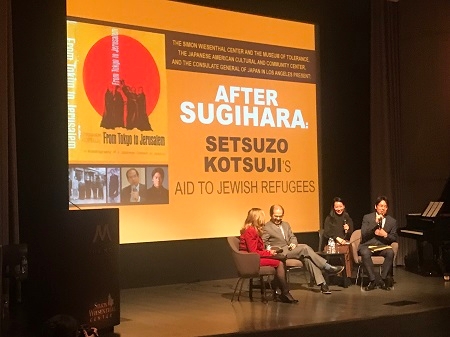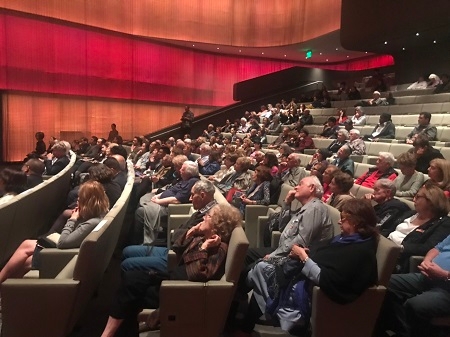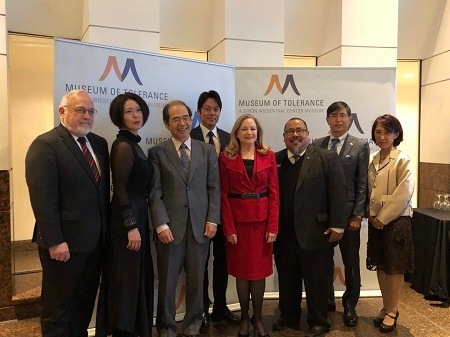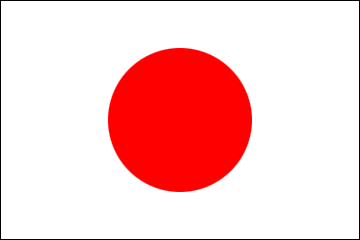"After Sugihara: Setsuzo Kotsuji's Aid to Jewish Refugees" at the Museum of Tolerance
2019/4/8
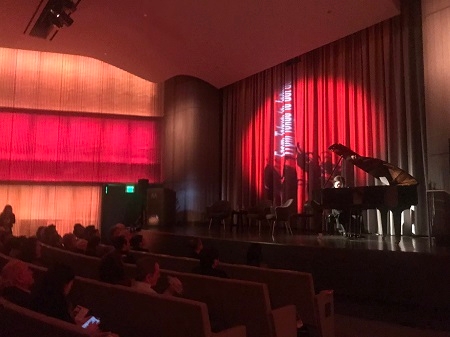
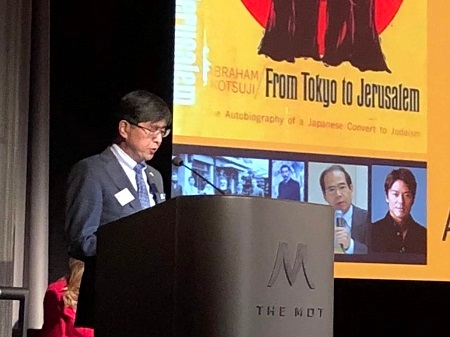
On March 27, the Simon Wiesenthal Center/Museum of Tolerance, Japanese American Cultural and Community Center and the Consulate General of Japan in Los Angeles co-sponsored an event highlighting the legacy of Japanese Hebrew Scholar Setsuzo Abraham Kotsuji, who helped provide safe passage and aid to Jewish refugees who landed in Japan during World War II on visas issued by Japanese diplomat Chiune Sugihara.
The evening began with introductory remarks by Director of the Museum of Tolerance Mrs. Liebe Geft. Interim President and CEO of the Japanese American Cultural and Community Center Mr. Daren Mooko and Consul General Akira Chiba shared brief words, followed by an introduction of the presenters by Rabbi Abraham Cooper, Associate Dean and Director Global Social Action Agenda of the Simon Wiesenthal Center.
The presentation featured talks by two special guest speakers from Japan, Dr. Yoshiji Hirose and Mr. Jundai Yamada. Dr. Hirose is a Professor of English literature at Notre Dame Seishin University, a translator of Yiddish into Japanese, and President of the Jewish Literary Society of Japan. Mr. Jundai Yamada made his acting in Japan in 1997 on the NHK TV drama Aguri and since then has appeared in numerous prominent TV, film, and stage productions. He made his debut as a nonfiction writer in 2013 with the book Setsuzo Kotsuji and the Jewish Refugees: The Man Who Connected the Visas of Life.
Dr. Hirose provided historical background on the life and contributions of Chiune Sugihara and Setsuzo Kotsuji, and described the Jewish community in Japan during World War II, clustered mostly in the Kobe area. He explained that Dr. Kotsuji's advocacy to government officials led to extensions on the short term Sugihara visas the Jewish refugees entered Japan on, and he later provided further support to help them resettle where they would be safe from Nazi persecution. Dr. Hirose also described Dr. Kotsuji's immersion in the Jewish faith and his eventual conversion in 1959.
Mr. Yamada shared his personal story of how he came to discover Setsuzo Kotsuji and to eventually write a memoir of his journey researching his life. As an undergraduate student at Pepperdine University he read Dr. Kotsuji's autobiography From Tokyo to Jerusalem, and became fascinated with learning more about his courageous acts helping Jewish refugees. It prompted him to reach out to Dr. Kotsuji's two daughters, later developing a personal relationship with them, and he also traveled to Israel to visit his gravesite and the Mirrer Yeshivah, whose leaders Dr. Kotsuji had maintained lifelong friendships with after their passage through Japan as refugees.
The event also featured performances by pianist Dr. Makiko Hirata, who paid tribute to the Jewish musicians who were in Japan during World War II, and a Q&A following the presentations. Dr. Kotsuji's one surviving daughter living in Japan, Ms. Mary Kotsuji, sent a message of gratitude specifically for the event, which was shared with the audience. Over 200 people attended the event.
The evening began with introductory remarks by Director of the Museum of Tolerance Mrs. Liebe Geft. Interim President and CEO of the Japanese American Cultural and Community Center Mr. Daren Mooko and Consul General Akira Chiba shared brief words, followed by an introduction of the presenters by Rabbi Abraham Cooper, Associate Dean and Director Global Social Action Agenda of the Simon Wiesenthal Center.
The presentation featured talks by two special guest speakers from Japan, Dr. Yoshiji Hirose and Mr. Jundai Yamada. Dr. Hirose is a Professor of English literature at Notre Dame Seishin University, a translator of Yiddish into Japanese, and President of the Jewish Literary Society of Japan. Mr. Jundai Yamada made his acting in Japan in 1997 on the NHK TV drama Aguri and since then has appeared in numerous prominent TV, film, and stage productions. He made his debut as a nonfiction writer in 2013 with the book Setsuzo Kotsuji and the Jewish Refugees: The Man Who Connected the Visas of Life.
Dr. Hirose provided historical background on the life and contributions of Chiune Sugihara and Setsuzo Kotsuji, and described the Jewish community in Japan during World War II, clustered mostly in the Kobe area. He explained that Dr. Kotsuji's advocacy to government officials led to extensions on the short term Sugihara visas the Jewish refugees entered Japan on, and he later provided further support to help them resettle where they would be safe from Nazi persecution. Dr. Hirose also described Dr. Kotsuji's immersion in the Jewish faith and his eventual conversion in 1959.
Mr. Yamada shared his personal story of how he came to discover Setsuzo Kotsuji and to eventually write a memoir of his journey researching his life. As an undergraduate student at Pepperdine University he read Dr. Kotsuji's autobiography From Tokyo to Jerusalem, and became fascinated with learning more about his courageous acts helping Jewish refugees. It prompted him to reach out to Dr. Kotsuji's two daughters, later developing a personal relationship with them, and he also traveled to Israel to visit his gravesite and the Mirrer Yeshivah, whose leaders Dr. Kotsuji had maintained lifelong friendships with after their passage through Japan as refugees.
The event also featured performances by pianist Dr. Makiko Hirata, who paid tribute to the Jewish musicians who were in Japan during World War II, and a Q&A following the presentations. Dr. Kotsuji's one surviving daughter living in Japan, Ms. Mary Kotsuji, sent a message of gratitude specifically for the event, which was shared with the audience. Over 200 people attended the event.
